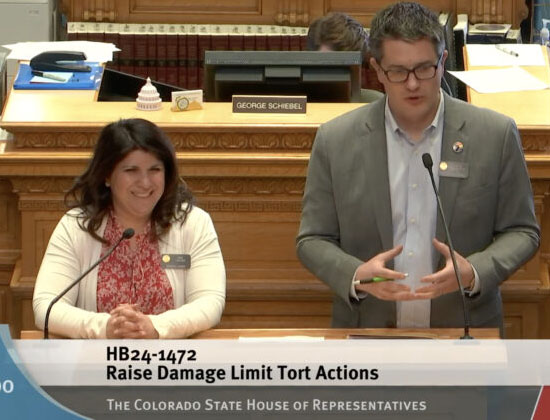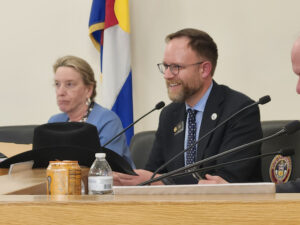Practice creates conflict of interest between lawyer and plaintiff By BEVERLY RAZON | Colorado Newsline…

Business leaders, trial lawyers strike deal on lawsuit damage caps
Colorado state Reps. Rose Pugliese and Kyle Brown explain their bill on lawsuit damage caps to the Colorado House.
POSTED BY: ED SEALOVER MAY 5, 2024
For the second time in less than a week, legislators reached a compromise Sunday to avert a multimillion-dollar battle on competing ballot initiatives — this time on the thorny issue of caps on noneconomic damages in the most serious medical and general lawsuits.
House Bill 1472, by Republican House Minority Leader Rose Pugliese of Colorado Springs and Democratic Rep. Kyle Brown of Louisville, passed without opposition through the House Judiciary Committee and then received preliminary approval on the House floor. If it clears the House and Senate as expected by Wednesday, it will get competing sides to nix ballot initiatives to remove all caps on catastrophic-injury and medical-malpractice deaths and to limit the percentage of damages that trial lawyers could keep in such cases.
The deal, announced by Gov. Jared Polis and competing interests just 15 minutes before HB 1472 went before legislators with four days left in the session, comes six days after an agreement avoided a potential ballot battle royale over a slew of oil-and-gas issues. And it should ensure that the November ballot, while crowded with major races and some other issues, will not require voters to have to make decisions on legalistic questions that could have major financial consequences on a wide raft of industries.
“We do believe that it was a priority to find a path that didn’t create a detrimental impact on our competitiveness as a state and our economy. And after several months of negotiations, this bill is a result of that compromise,” Colorado Chamber of Commerce President/CEO Loren Furman told committee members. “We believe it gives predictability and stability to businesses and consumers.”

Colorado Chamber of Commerce President/CEO Loren Furman speaks at the organization’s 2023 annual meeting about keeping the state competitive.
How the new bill changes damage caps
HB 1472 raises the noneconomic damage caps for medical malpractice suits — those damages awarded for factors like emotional stress and suffering rather than for calculable costs like medical bills and loss of wages — from $300,000 to $875,000 over five years. And it creates a new claim specifically for wrongful death and raises the damage cap for that to $1.575 million over the next five years, with both caps rising biennially by the rate of inflation beginning in 2030.
It also hikes the caps for general-liability lawsuits from the current level of $250,000 to $1.5 million and boost the $642,000 cap on noneconomic damages in wrongful-death lawsuits to $2.125 million, with both caps rising by inflation every two years beginning in 2028. The new caps apply to lawsuits that are filed on or after Jan. 1, 2025.
In reaching consensus with the Colorado Trial Lawyers Association, the Colorado Chamber and the health-care industry group Coloradans Protecting Patient Access avoided the possibility of voters choosing to eliminate those caps altogether. Initiatives funded by the CTLA sought to end caps in catastrophic-injury and wrongful-death suits and also sought to open more communications between health-care professionals to discovery in lawsuits, essentially eliminating Colorado’s peer-review process.
Shortly after those initiatives were filed early this year, CPPA responded with two initiatives that sought to limit the percentage of damages that trial lawyers could receive in such suits and limit the fees they could charge clients for motions as cases proceed. The groups also backed a proposal, Senate Bill 130, that would have raised the medical-malpractice noneconomic damages cap from $300,000 to $500,000 over a five-year period, and that bill cleared its first committee in bipartisan fashion over trial-lawyer protests.
Months of intense negotiations

Colorado state Reps. Rose Pugliese and Kyle Brown begin to present HB 1472 to the House late Sunday afternoon.
Seeking ways to avoid both the expenses and uncertainty of dueling ballot initiatives, their proponents met for months to find some compromise that could be passed legislatively. HB 1472 represents that deal, and in addition to satisfying both business and trial-attorney interests, it also earned the backing of both Republicans and Democrats, unlike the two bills resulting from the oil-and-gas deal.
“You don’t really want to put a price on a life, certainly a maximum price. But at the same time, you have to have some certainty in law,” said Rep. Matt Soper, a Delta Republican who sits on the board of Delta Health, a rural hospital system in western Colorado. “Otherwise, insurance would be so high that no one would ever become a doctor. And right now, our doctors do struggle because insurance is their number-one expense.”

Colorado state Rep. Matt Soper speaks in a House committee hearing in April 2024.
Indeed, a study commissioned by the American Property Casualty Insurance Association and the Colorado Chamber estimated that removal of noneconomic damage caps could cost Colorado $2.1 billion in annual gross product and 15,500 jobs. The study, criticized by trial lawyers, argued insurance premiums would rise substantially across industries due to the chance of nine-figure jury awards that have been seen in other states and lead to reductions in business activity and loss of future economic development.
What each side gets from the deal
For business leaders, keeping caps in place, even if they are doubled or tripled, will allow insurance premiums to rise at a steadier and less disruptive pace, enough to avoid any exodus of employers or doctors.
For trial lawyers, whose supporters cite cases of negligent professional behavior leading to significant harm or loss of life, they get from the deal a significant boost in caps, even if it falls short of the elimination for which some industry leaders called. Several attorneys said during the SB 130 hearing that the current caps are so low that lawyers can’t afford to take on the kinds of complex medical-malpractice cases that involve significant time and research without the prospects of recouping that investment.
“We believe House Bill 1472 is a giant step toward providing access to justice for Coloradans, which then further helps to right the wrongs that we see happening to Coloradans every day as trial lawyers,” CTLA President Kari Jones Dulin said. “It truly was a compromise.”
In addition to the legislators and the interest groups involved with the negotiations, the deal brought praise as well from Gov. Jared Polis, who has argued that a ballot fight not only would have been expensive but could have been very risky for Colorado.
Deal on caps will aid particular health-care professionals
“Here in Colorado, we work together to get things done, and this agreement shows how people from different viewpoints can work together to move Colorado forward,” Polis said in a news release. “I appreciate the bill sponsors and the hard work and sincere negotiations from all sides to get this done, preventing more costly and divisive ballot measures, protecting the rights of patients and saving people money on healthcare.”
SB 130 remains on the calendar for debate on the Senate floor but is expected to be killed as soon as HB 1472 passes through the Legislature.
Business and medical leaders have warned that any hike in noneconomic damage caps likely will impact insurance premiums. But these smaller increases will be more palatable than the potentially astronomic hikes that could have proved particularly burdensome to doctors working in lower-income areas and to physicians doing the riskiest and often most life-saving surgery.
“This bill ensures that consumers are compensated for injuries and deaths that result from negligent activity, while at the same time protecting access to health services across the state, especially specialty care and access in rural Colorado,” CPPA Executive Director Tamra Ward told the House committee. “We’ve worked tirelessly on this effort — as was noted — with our coalition, with our partners in the business community and with the Trial Lawyers Association.”


